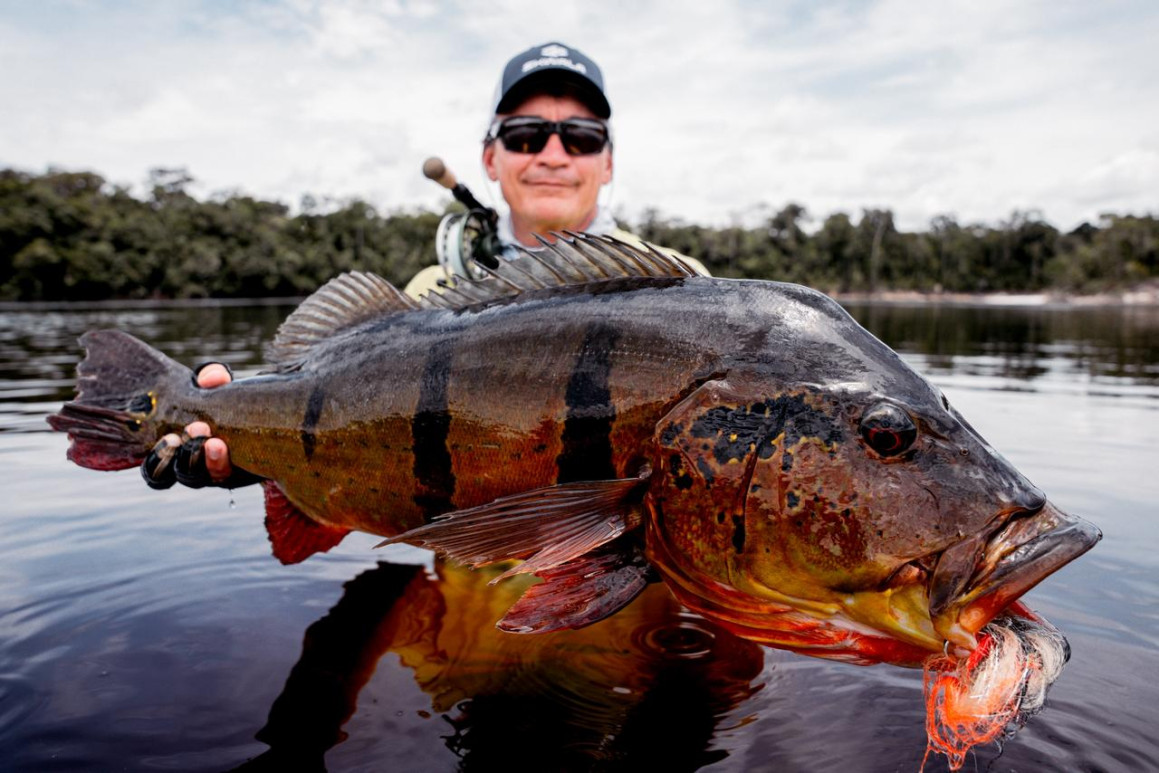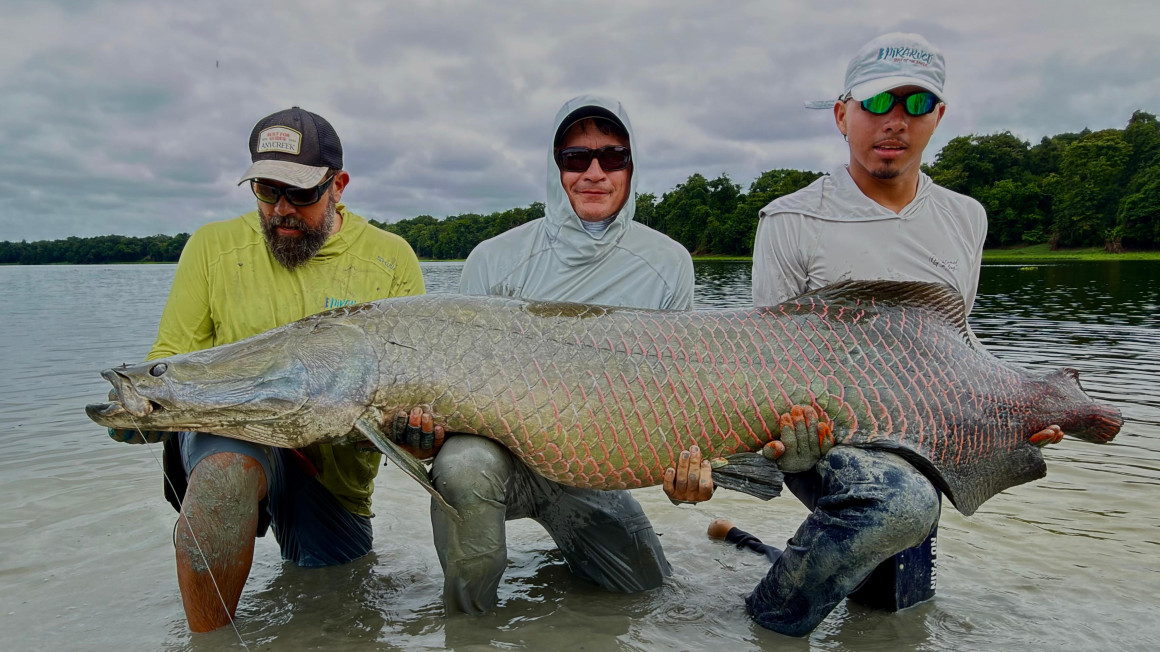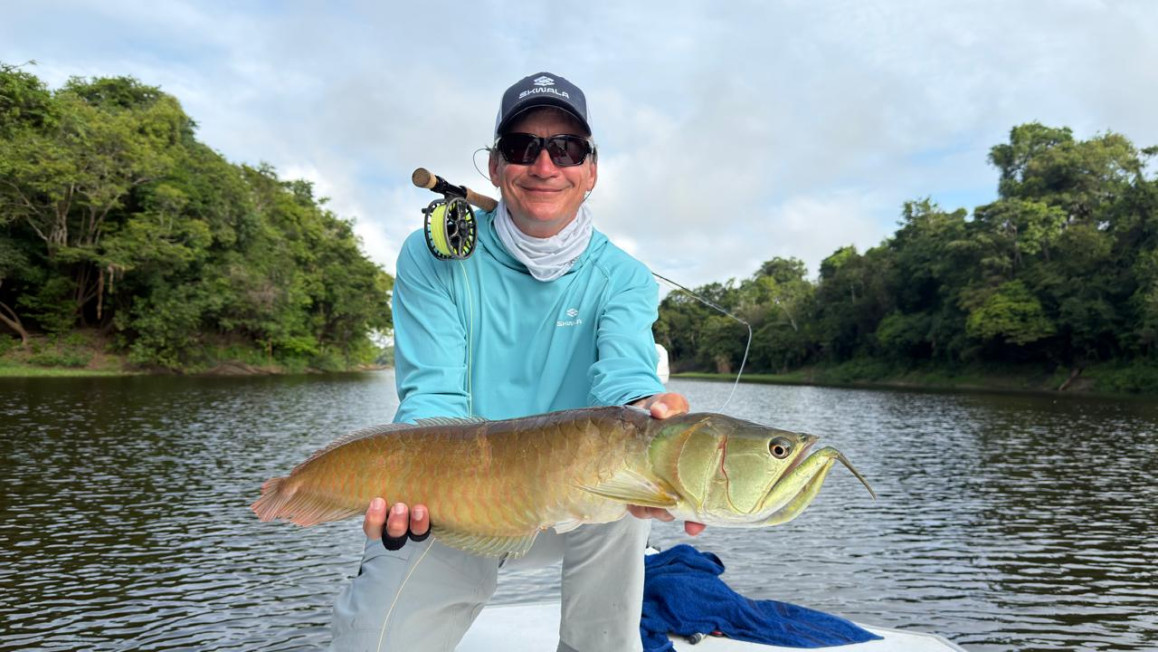The Safari Club convention floor in 2025 was the usual chaos of taxidermy and tall tales, but Rodrigo Salles stood out—quieter than most, more deliberate. He ran Untamed Angling's operations in the Brazilian Amazon, and when he started talking about the Rio Marié and Pirarucú, something shifted in the conversation. These weren't just remote waters—they were protected reserves holding what might be the world's largest concentrations of massive peacock bass and arapaima, fish that grew to prehistoric proportions in waters dedicated to fly fishing anglers.I'd been carrying the idea of peacock bass around for years, and the arapaima—the pirarucú, as the locals called it—had occupied its own corner of my imagination. But there was a problem I couldn't ignore."I've never fly fished," I told him.Rodrigo looked at me the way you look at someone who's just told you they're thinking about climbing a mountain but have never worn boots. Then he said something that sealed it: "With a little practice, you could be ready for these monsters."I've always been a wanderer, the kind who'll travel to remote country just to observe something simple—hunt, fish, watch how people live where the modern world hasn't quite arrived. Time away from home doesn't bother me. Takes about a week to settle in, then I can stay as long as the place will have me. I'm drawn to challenges that other people find unreasonable, the kind where you don't know if you're capable until you're already committed.So when Rodrigo said I could learn to handle a fly rod well enough to tangle with fish that can weigh more than a grown man, it felt less like an invitation and more like a dare I couldn't refuse.The plan made a certain kind of sense. Start at Rio Marié for peacock bass, then move to Pirarucú for the giant arapaima—learn the fundamentals on powerful fish before graduating to the prehistoric monsters. The Marié sat deep in indigenous territory, over 500 miles of protected water that held some of the largest peacock bass on earth. Fish over twenty pounds weren't rare there—they were regular occurrences. Then Pirarucú, located in the Mamirauá Reserve about 600 kilometers west of Manaus, where arapaima gathered in the largest protected population anywhere.I bought a five weight rod and spent about a week at a pond near my house, learning the basics. The casting motion felt unnatural at first, all timing and rhythm where spinning gear had been simple mechanics. But I kept at it, and by the time I boarded the plane to Manaus, I could put a fly where I wanted it most of the time.The week at Rio Marié proved Rodrigo right. The peacock bass were brutally strong—maybe the hardest-fighting freshwater fish you can take on a fly rod in jungle water. I landed a couple of large ones—82 and 83 centimeters—and fighting them with a 9 weight rod was a different education entirely from that week at the pond. Learning the weight and balance of that heavier rod, understanding how much pressure you could apply without breaking off—it was preparation
I needed. Because waiting at Pirarucú was the 12 weight rod required for battle with arapaima.But the week at Rio Marié gave me more than muscle memory. There was a group there, people who welcomed me in as if I'd been part of their trip all along. That kind of thing doesn't happen often—strangers becoming companions in a place so remote that the outside world feels like something you imagined. We fished hard during the days and gathered in the evenings, swapping stories and making plans for future trips. The kind of friendships that form quickly when you're far from everything familiar. It made the trip extraordinary in ways I hadn't expected. I wondered if the river gives such gifts twice or only once before the jungle takes them back.
By the time we loaded into the float plane for the transfer to Pirarucú, my hands knew what a real fish felt like on the end of the line. Because what waited in the Mamirauá Reserve wasn't just bigger—it was something else entirely.
DAY ONE: THE MENTAL GAMEFirst day was a sermon on humility. Not a single bite. Just hours of casting into water that holds fish the size of grown men, watching the line land and retrieve, land and retrieve. The howler monkeys provided a distant soundtrack, their calls echoing across the water like some ancient warning system. Caimans watched from the waters, a prehistoric predator that knows no fear. Pink dolphins surfaced occasionally in the middle distance, their appearance so casual you'd miss it if you weren't paying attention. The heat built slowly, the way it does in the jungle—not oppressive all at once, but accumulating until you realize you've been soaked in sweat for hours. It's the kind of day that teaches you patience isn't about waiting for something to happen. It's about being present when nothing does.It's the kind of day that sorts out who really wants to be there. The jungle doesn't owe you anything. Neither does the river.After the first day's fishing session came to an end, we gathered in the main room for dinner where I met the other anglers who'd come to fish these waters. The conversation started the way these things do—family, travel experiences, hunting and fishing stories. Through those conversations we learned of our common ground, the shared experiences that connect people even when they come from different corners of the world.Andrey had been a soldier once, now practiced law. Alex, at 72 and in remarkable health, had lived several lifetimes—military pilot, world-renowned doctor, and judging by the stories he told with quiet authority, a man who'd been present for moments that shaped how medicine was practiced. He'd published fifteen books on health with millions of copies sold, though you'd never know it from the way he spoke. The kind of experience you don't boast about because it speaks for itself. Egor was their host, documenting the trip through his lens—a Soviet citizen who'd made his way to Argentina where he now ran a travel business alongside an adventure TV show.We didn't stay on safe topics. The conversation moved to the war in Ukraine, the politics surrounding the conflict, the kind of talk that only happens when you're far enough from civilization that pretense falls away. We talked and drank late into the night until we noticed the lodge host nearly asleep in the corner. By the time we retired to our rooms, we were already making plans for future travels, talk of visiting Russia, already looking forward to the next evening and where the conversation might take us.
DAY TWO: 200 CENTIMETERS OF CONSEQUENCEMorning session passed in that patient rhythm of casting and waiting, watching the water for signs that never came. It gives you time to think, to let your mind wander. I thought about Rio Marié again. About the friendships formed there, the kind that surprise you in their depth and speed. The memory sat with me differently now, colored by distance and time. I wondered what the evening would bring here at Pirarucú—what new stories my new companions might share.The morning had the same rhythm as the day before—cast, strip, watch. The jungle was louder now that I knew to listen for it. Birds I couldn't name called from the canopy. A caiman drifted past the boat, just eyes and snout visible. The guide pointed to a dolphin working a section of water. Not a word spoken just the rhythm of the Amazon. In this moment, the Amazon was showing me what patience looked like.Then a subtle tap on the line. I continued the slow strip and felt the weight of the fish. I strip set the hook four times and the fish took his first run.An arapaima. The battle had begun and everything else disappeared. The rod bent like a question being asked in a language I barely understood.
He ran. Hard, deliberate runs that stripped line and made me grateful for every knot the guide had tied properly. Then came the jumps—head-shaking eruptions near the boat, close enough to feel all that mass breaking the surface. We worked our way to a shallow spot on a point to land him—trying to boat a fish that size is the kind of ambition that ends poorly. You respect what you can't control.Two meters, six and a half feet of prehistoric muscle now in my hands. We quickly cleaned the mud from the fish before the caimans moved in, got the photograph, and released the prehistoric giant back to the Amazon. My quest complete. Anything else the river gives is a bonus.
DAY THREE: THE SHOWThe day started right out of the gate in the morning session. Another arapaima, this one 178 centimeters. He came up breaching, full-body explosions that seemed almost vindictive. The head-shaking jumps were spectacular and exhausting—nature putting on a show for an audience of monkeys, birds, and a couple of guys in a boat. Long hours of slow stripping and casting while observing the pink dolphins breaching and being serenaded by the distant howler monkeys. All while fishing under the watchful eyes of the caimans.
DAY FOUR: THE ONE THAT MATTEREDLike every morning, the troops of howler monkeys echo inside your head like a distant mystical monster. Birds and caimans the welcome distraction. The arapaima rolling on the surface tell you they are there, but you have to get the lure just in front of them.Then the tap, close to the boat with a pile of fly line at my feet. I set the hook into something heavy. An arapaima, substantial. The kind of fish that makes a novice fly fisherman recalculate everything he thought he knew about line strength and leverage. The giant fish made his run as I tried to clear the loops and guide the line to the reel. Then my mistake—one simple loop caught the reel handle. It broke like sewing thread.I won't guess at his size. Fish stories grow in the telling, and I've never been interested in fiction. What I know is this: he was heavy on the rod, and I failed him in the moment that mattered.
That's the whole story. "And that's all I have to say about that." —Forrest Gump
DAY FIVE: TAMBAQUI AND ARAWANAI start each fishing morning sitting on the covered floating porch. No one stirs around the lodge until 5:40ish, so I have time to watch this section of Brazil wake up. By 6:00 the coffee is ready and I've made a friend of a midsized yellow-breasted bird that I exchange whistles with until he tires of the banter and flies away. That bird is like clockwork. It's a good way to start the day.Today was something different—the morning session was focused on Tambaqui. Changing back to a 9 weight rod was like fishing with a feather. The lure is an orange ball and a hook. If you throw it properly it makes the sound of a musical note when it plops in the water. The key to catching the Tambaqui is you play it a song. You land the ball lure softly three times in the same place. The three drops of the lure make the song. At first I thought it was a tall tale, but sure enough it calls them to the lure.The day of fishing was great. In the morning session I caught a solid fish around 12 pounds and multiple 3 to 6 pound fish before heading into lunch. The schedule here takes me back to kindergarten—you get breakfast, they give you instructions and you go out to recess. Then they bring you for lunch and a nap. Then back out to recess. Who wouldn't love this schedule?The afternoon session brought muddy edges from the afternoon rain and the arawana were very hard to find, so we switched back to fishing for the Tambaqui. Several hookups, great tug of war sessions. Then it happened, a giant Tambaqui. The bite was soft but I set the hook into a monster that went into a full run. The reel was screaming and the line was fast dumping off the reel. I was finally able to gain some line back to the reel only to see his powerful run strip all that was gained. In time I was able to get the giant close to the boat. Once by the boat he still would not give up for several more minutes until finally I turned him and rolled him into the net. A true goliath for the species in these parts—19 and a half pounds of hard-fighting fish. A testament to what these waters produce. We quickly took our photos, allowed him to rest, then released him back to fight again another day.
DAY SIX: THE FINAL QUESTOur quest for the final day was the only fish I hadn't caught—a true trophy arawana, something picture-worthy. I thought it would be an easy day. The heat had other plans. It built quickly as the sun rose over the trees, sweat came instantly, the jungle reminding you that comfort is temporary here.The cure for all of it was the arawana fishing. The kind of fishing that makes you forget about heat and sweat entirely. This was sight fishing—fast, full of action, entertaining in a way that keeps your attention sharp. You watch the surface, spot the fish, make the cast, repeat. The rhythm is urgent where arapaima fishing is contemplative. No patient strip and watch, no meditative casting into the unknown.I caught arawana of all sizes through the morning. Then on the last cast before moving on, I hooked the one. The fish was near a tree that had fallen into the river, and he knew exactly where to go. Line stripped from the reel as he headed straight for the tangle of branches. We maneuvered the boat, trying to clear the fish from the tree, but he was faster. The giant wrapped the line several times around a branch near the surface. We moved quickly into position, freed the tangled line, and brought the great fish to hand. A trophy specimen, the kind you travel for.
Now halfway through the morning session with a great arawana in the photos, we switched back to arapaima until lunch. Back to the slow strip and watch, the patient rhythm, the waiting. The contrast between the two couldn't be sharper—one fish demands constant attention and quick reflexes, the other teaches you that sometimes the hardest part of fishing is doing nothing at all.After the morning session ended and we'd finished lunch, we all retired to our chairs to wait for the afternoon pursuit. Then about thirty minutes before we were to head out for arapaima, the rainforest lived up to its name. A massive downpour, no thunder, no lightning—just heavy rain drumming on the lodge roof and sheets of drops splashing into the Amazon. With all that new cool water on the surface, we could only imagine how the afternoon session would begin.It's 2:15 pm. Time. I return to my room, clean my sunglasses, pull the neck and face buff over my head one last time. I take a last look around, put my hat on, and head for the boat. Has the river given all it's willing to share, or is there one last moment it's willing to reveal to me?
We returned to the casting and retrieving for arapaima. The fish were rolling all around us, their massive bodies breaking the surface in lazy arcs. Bubbles rose from the deep, marking where the giants moved below—they were everywhere, surrounding the boat. But the river had given us our share. Sometimes the knowing is enough. We finished our last day enjoying the sights and sounds of the river—the pink dolphins working the cooled water, the howler monkeys calling from somewhere in the distance, the patient caimans watching from the banks. The guide smiled, understanding what I'd learned without needing to say it.You travel to these places not because they're easy or because they guarantee anything. You go because the alternative—staying still, staying comfortable—is its own kind of breaking. The Amazon takes what it wants and gives what it chooses, and mostly that arrangement seems fair.


















 riomarieflyfish
riomarieflyfish